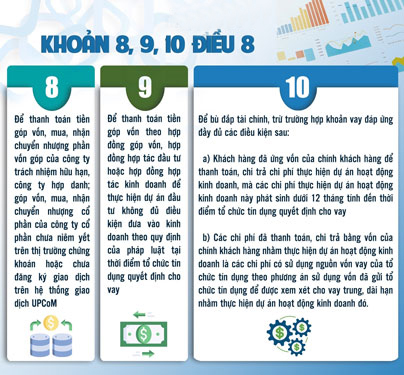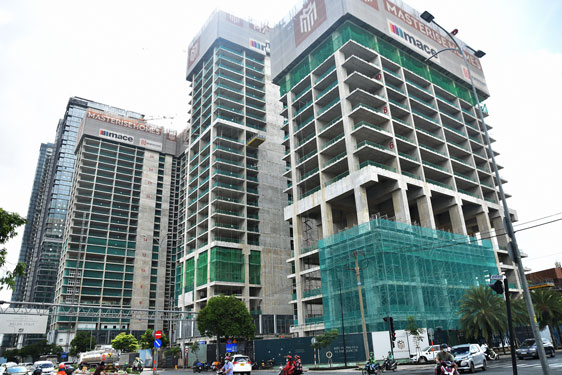On August 24, the stock market recovered strongly after a week of continuous decline and struggle. This positive development was significantly contributed by real estate stocks, when many of them increased to the ceiling price or near the ceiling price after the State Bank of Vietnam (SBV) temporarily postponed the implementation of some regulations restricting lending in Circular 06, following the direction of the Prime Minister .
Timely decision
Specifically, after Prime Minister Pham Minh Chinh issued an urgent document on the afternoon of August 23, the same night, the State Bank of Vietnam issued Circular 10/2023/TT-NHNN on suspending the implementation of Clauses 8, 9 and 10, Article 8 of Circular 39/2016/TT-NHNN (supplemented by Clause 2, Article 1 of Circular 06/2023/TT-NHNN). The purpose is to prioritize promoting economic growth. Circular 10 takes effect from September 1 until the effective date of the new legal document regulating these issues.

Provisions of temporary suspension of enforcement. Graphics: ANH THANH
As soon as he received this information, Mr. Le Hoang Chau, Chairman of the Ho Chi Minh City Real Estate Association, sent his thanks to the Government and the Prime Minister for their decisive and timely direction so that the State Bank of Vietnam could soon issue Circular 10 to stop implementing Clauses 8, 9 and 10 of Article 8 as stipulated in Clause 2, Article 1 of Circular 06. This will help increase the ability to access credit for the business community, investors and people.
Talking to a reporter from Nguoi Lao Dong Newspaper, Mr. Pham Dinh Huy, Investment Director of Nam Long Investment Joint Stock Company, expressed his joy because the suspension of some provisions of Circular 06 is a good decision for real estate enterprises, helping enterprises better access loan capital to develop more land funds, restructure existing debts... In addition, this also helps enterprises call for investment capital more easily.

An apartment project under construction in Ho Chi Minh City. Photo: TAN THANH
Mr. Ngo Duc Son, General Director of DRH Holdings, said that while the real estate market is difficult, capital is a major concern for many businesses, the suspension of lending restrictions will certainly remove many obstacles for real estate businesses in need of loans. Mr. Son hopes that after efforts from the Government, ministries and sectors, the real estate market will recover.
Meanwhile, Mr. Dang Anh Tu, General Director of Saigon 5 Real Estate Joint Stock Company, said that the most capital-hungry stage is when the investor starts to implement the project, because at that time the enterprise already has the right to use the land, can borrow from the bank based on this asset but the loan value is not high, while the enterprise wants to borrow based on the value of the project that has all kinds of licenses, so excluding the story of the enterprise "backyard" of the bank if the investor is good, legal and has a license, it can disburse, but to the point of having to "meet the conditions for opening for sale" as Circular 06, it is very difficult for the enterprise. Not to mention, if the project has met the conditions for opening for sale, the enterprise only needs to sell the goods, collect money to continue implementing the project, without needing to borrow from the bank.
Mr. Huynh Minh Tuan, Director of Mirae Asset Securities, commented that the postponement of the above provisions will help businesses, especially real estate businesses, to access capital from banks more easily in difficult economic conditions. "This also contributes to improving credit growth in the economy when the demand for loans to contribute capital, buy shares, and cooperate in business is very large. However, the banking industry also needs to control risks effectively," said Mr. Tuan.
Analysts from Maybank Investment Bank Securities Company (MSVN) also said that the postponement of the above provisions is positive news for the real estate industry, helping the industry become more active through easier access to loans from credit institutions, in the context of real estate enterprises being starved of capital as at present.
"The lending restrictions of Circular 06 will be clearer for real estate businesses after the market has new legal frameworks such as the Land Law, Housing Law and Real Estate Business Law (expected to be passed at the National Assembly session in October 2023). At this time, the regulations and definitions will be clearer and real estate companies can easily access bank capital without being equated with good and bad" - MSVN experts said.
Reduce risk with conditions
Speaking to a reporter from the Lao Dong Newspaper, the general director of a commercial bank headquartered in Ho Chi Minh City also assessed that the State Bank's decision to stop implementing some provisions prohibiting lending in Circular 06 is appropriate to reality. Because currently, there are many customers who need to borrow money from banks to contribute capital to establish a company, implement a project, cooperate in business, pay deposits to carry out future transactions, but at the time of signing the contract, they do not meet the conditions for implementation according to legal regulations... This need occurs in many fields, the most notable of which is real estate.
For example, a company can borrow money from a bank and then contribute capital with another company to build an apartment project. At that time, in addition to the project having a full legal basis, the bank will consider the feasibility, the borrower's ability to repay the loan and many other factors before daring to disburse. When a real estate company has capital to implement the project, it will create jobs, promote the development of other industries, and contribute to economic growth.
However, leaders of some other commercial banks said that for a long time, many enterprises with close relationships with bank owners have established dozens of "satellite" enterprises to borrow capital from banks and then transfer the loan amount to the same enterprise to invest in projects. This makes it impossible for banks to prove the relationship between enterprises to limit the lending rate according to regulations. And in fact, there have been cases of customers defaulting, causing banks to face liquidity difficulties.
To resolve this situation, according to Professor Tran Ngoc Tho (Ho Chi Minh City University of Economics), the banking management agency does not necessarily tighten lending as stipulated in Circular 06, then have to cancel it because it is not suitable.
Instead, the banking management agency can learn from the US Federal Reserve (FED) to increase the real estate lending coefficient, similar to the FED not prohibiting banks from trading high-risk securities but having to bear a risk coefficient of up to 1,250%. Thus, no bank owner would dare to lend heavily because then the equity capital (including the bank owner's capital) would have to account for a very large part of the total loan amount.
"On the other hand, when lending too much real estate and encountering liquidity difficulties, the bank mortgages that property to borrow capital from the State Bank. The first step is to determine that the property has a value of zero, then gradually re-determine the value of the mortgaged property. Thus, bank owners will be afraid and will not dare to find ways to lend money to familiar real estate businesses" - Professor Tran Ngoc Tho analyzed.
Agreeing with this view, lawyer Truong Thanh Duc, Director of ANVI Law Firm, also said that if there are cases with risks arising, contrary to the nature of lending activities but not yet prohibited by the Law on Credit Institutions, it is best for the State Bank to set out technical conditions to limit instead of prohibiting. For example, when the risk coefficient is increased, banks will consider reducing lending to that field. When the technical conditions are really high, it is no different from not prohibiting but prohibiting lending.
Lawyer Truong Thanh Duc also said that for many years, the 6 cases that are not allowed to be lent in Circular 39/2016/TT-NHNN include cases that are not yet regulated in the Law on Credit Institutions and other laws, or are only regulated in decrees (for example, Decree 24/2012/ND-CP).
Recently, Circular 06 has stipulated 4 more cases where loans are not allowed, 3 of which are completely new. These cases need to be added to the provisions in Articles 126 and 127 on cases where credit is not allowed and restricted in the Law on Credit Institutions 2010.
Source




![[Photo] Top players gather at the 2025 Nhan Dan Newspaper National Table Tennis Championship](https://vphoto.vietnam.vn/thumb/1200x675/vietnam/resource/IMAGE/2025/5/23/9ad5f6f4faf146b08335e5c446edb107)




























































































Comment (0)